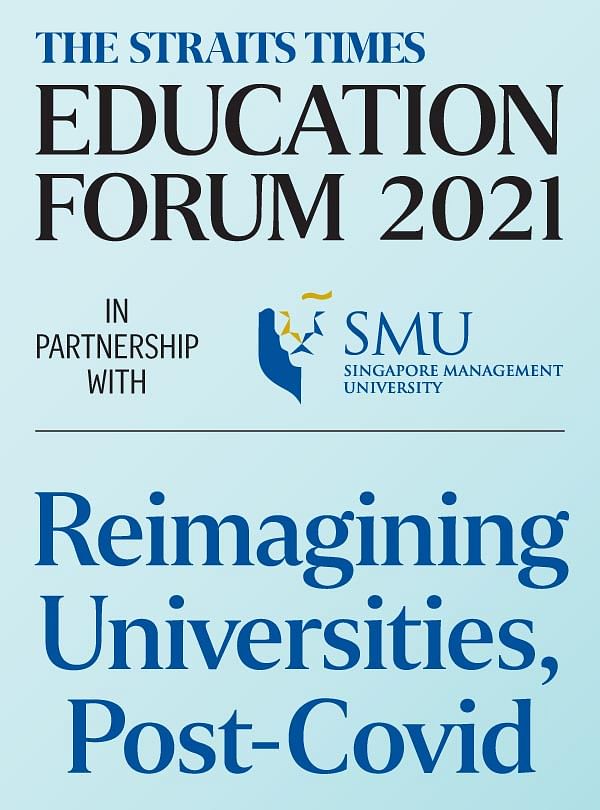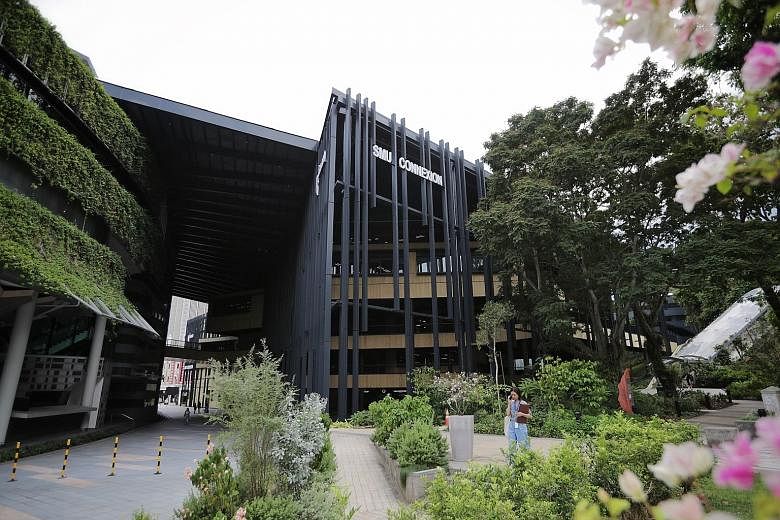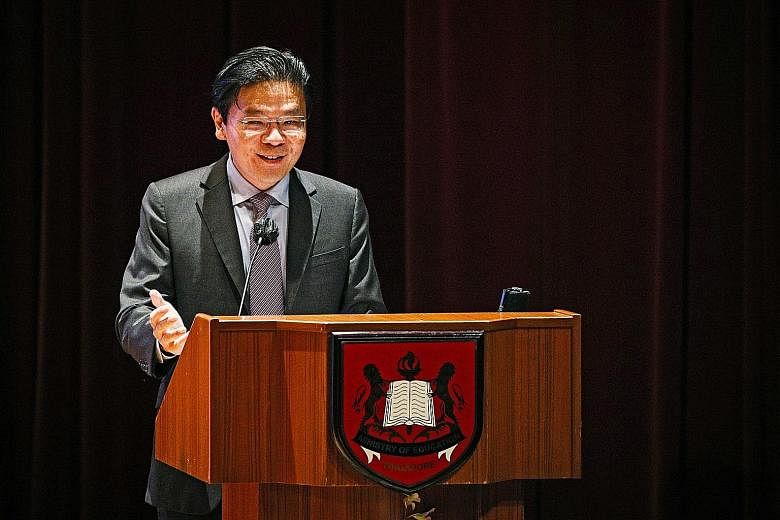As the pandemic raged, Singapore's six autonomous universities offered around 1,000 extra places last year, taking in 17,500 Singaporeans. This pulled up the cohort participation rate to 42 per cent - instead of the 40 per cent that had been planned.
Some of the additional places were taken up by Singaporeans who had initially planned to study overseas while others went to polytechnic diploma holders who opted to study instead of joining a weak job market.
Education Minister Lawrence Wong, who released the figures in an interview with The Straits Times, said his ministry is willing to make more places available this year as well, if the pandemic situation continues.
Going forward though, Mr Wong said now that the Government is encouraging Singaporeans to keep learning and upgrading their skills throughout their life, planning for university places based on the cohort participation rate of 40 per cent - as is currently the case - becomes less relevant.
"We have been talking about SkillsFuture and lifelong learning. So, there's no need to front-load four years of education before you go out to work. You can have a chance to get a university degree or further education any time through your working life.
"I expect some proportion of students will still do that - to go to university for their first degree before going out to work, but increasingly you will see more pathways for students to go for further studies when they are older, in the course of their working life."
He also stressed that those aspiring for a degree need not take the traditional four-year route but consider other routes including alternating between work and study.
While saying that Singapore must further improve its technical and vocational education, he also had good advice for young people on how to make the most of their university education.
Q: You said there's no need to front-load university education before going out to work. But doesn't government funding for undergraduate university places restrict choices? Would MOE tweak funding to allow more flexibility?
A: In fact, already, the current funding allows for flexibility. There is no requirement that you must finish your degree in four years.
So, if a student wants to take a year off to do something, whatever it is, and the university agrees that it's useful, then that is allowed.
But we also need to have a limit on the number of years a student takes to complete his degree. It can't go on indefinitely. But there is room to relook this, to allow more flexibility.

Q: In the future, can Singaporeans get two bites of the cherry - receive government subsidy to take up a second degree?
A: The question we have to ask, is it necessary to have to study for a second undergraduate degree?
Under the SkillsFuture initiative, we already provide for a significant amount of funding for a whole range of different courses offered by the universities, polytechnics, ITE (Institute of Technical Education) as well as by industry training providers, so I would say Singaporeans are already getting multiple bites of the cherry.
If an individual, a degree holder, wants to learn new skills or upgrade his knowledge and skills, is there a need to undertake another four-year degree?
They can still go back to the university and take modules, which can be stacked into micro-credentials which could be more targeted and relevant.
We will support individuals who want to acquire new skills. But we must ensure that the skills they acquire are relevant to the industry, help them maximise their potential and secure better jobs, better careers.
Q: Is MOE open to allowing non-traditional models of higher education - such as university programmes run by employers for which there is great demand?
A: First, let me say that we are not wedded to the traditional model of university education. We remain open.
To be fair to our universities, they are prepared to keep on changing and evolving. Perhaps more so than you see in other countries.
Our university leaders recognise the need to change, to disrupt their own way of doing things, to keep on evolving.
So, they have come up with innovative programmes, different ways of teaching and learning, and partnering with companies.
Q: You led a major review of the university system in 2011 which led to expanding the cohort participation rate to 40 per cent last year, a more diverse university sector, as well as a good mix of full-time, part-time and work-study degree programmes. Are you glad that many of those recommendations have been adopted?
A: It is important to have built that diversity of offerings, to include universities with a more applied, skills-oriented focus. We now have that with the Singapore Institute of Technology and the Singapore University of Social Sciences.
The other striking difference I have seen is that all the universities have built strong partnerships with industry, and they are a lot more involved in SkillsFuture and continuing education and training...
Too many countries have shifted to an overly academic model of tertiary or university education. I think in Singapore, we have been fortunate to avoid some of these imbalances...
But we can do even better in this regard. That's why I have asked Dr Maliki Osman to lead a review to strengthen this further.
Q: Can you talk about the university choices you made when you were 18? Should those heading for further education specialise or go for a broader general education?
A: My choice to go to the United States - my parents had always said, if you want to go overseas, we don't have the money, you have to get a scholarship.
So when the chance of a PSC (Public Service Commission) scholarship came, I grabbed it. I was not particular about which university. But I wanted to go to the US... because all the guitarists and musicians I followed were largely American.
I took up a range of subjects in the first two years, including a class on the history of rock and roll.
When I was in my second year of university, a friend of mine who was in his final year said although he majored in economics, he really didn't know much about the subject. That was a mini wake-up call for me. In my first two years, I took a range of different courses and didn't really think too much about what I was learning.
And I realised, gosh, I could very well end up like him. So in my remaining two years, I thought very carefully about what I wanted to study and started delving more into macroeconomics, the quantitative aspects of economic modelling, understanding fiscal and monetary policies, and later on, the Singapore model of economic development.
So my advice to students would be to start with a broad education, enjoy your learning, but also specialise in an area you are interested in and ensure you acquire deep knowledge and skills in it.
So subject specialisation is still necessary and will still be important.
But also develop the ability to see the broader connection of things and how to work seamlessly across different disciplines. This is where interdisciplinary learning is needed. It encourages adaptability and an important mindset of agility.
-
About Education Minister Lawrence Wong
-
Mr Lawrence Wong was elected a Member of Parliament in May 2011 and subsequently held positions in the ministries of Defence, Education, Communications and Information, Culture, Community and Youth, and National Development.
After last year's general election, he was appointed the Minister for Education and Second Minister for Finance.
Mr Wong co-chairs the multi-ministry task force on Covid-19, and is a member of the GIC board, the Future Economy Council, the Research, Innovation and Enterprise Council, and the National Research Foundation board.
He also co-chairs the Singapore-Shanghai Comprehensive Cooperation Council.
Mr Wong also chairs the PAP Community Foundation and contributes to the labour movement as chairman of the Singapore Labour Foundation, and adviser to the National Trades Union Congress (NTUC) U Associate Leaders' Circle, and the Union of Power and Gas Employees.
Beginning his career as a civil servant, Mr Wong's portfolio included being the chief executive of the Energy Market Authority, and the principal private secretary to Prime Minister Lee Hsien Loong.
At the community level, he was involved in youth work in church and volunteer organisations.
Mr Wong was educated at Tanjong Katong Secondary School and Victoria Junior College. He obtained his bachelor's and master's degrees in economics from the University of Wisconsin-Madison and the University of Michigan-Ann Arbor. He also holds a master's degree in public administration from the Harvard Kennedy School.
His interests include music (he learnt to play the guitar at the age of eight). He is also a dog lover.



